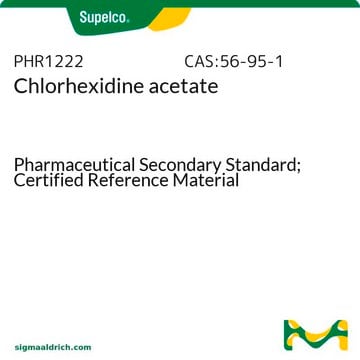1111103
USP
Chlorhexidine acetate
United States Pharmacopeia (USP) Reference Standard
Sinónimos:
Chlorhexidine diacetate salt
About This Item
Productos recomendados
grade
pharmaceutical primary standard
API family
chlorhexidine
manufacturer/tradename
USP
application(s)
pharmaceutical (small molecule)
format
neat
storage temp.
2-8°C
InChI
1S/C22H30Cl2N10.2C2H4O2/c23-15-5-9-17(10-6-15)31-21(27)33-19(25)29-13-3-1-2-4-14-30-20(26)34-22(28)32-18-11-7-16(24)8-12-18;2*1-2(3)4/h5-12H,1-4,13-14H2,(H5,25,27,29,31,33)(H5,26,28,30,32,34);2*1H3,(H,3,4)
InChI key
WDRFFJWBUDTUCA-UHFFFAOYSA-N
¿Está buscando productos similares? Visita Guía de comparación de productos
General description
Application
- Chlorhexidine Acetate Topical Solution
- Chlorhexidine Gluconate Oral Rinse
- Chlorhexidine Gluconate Solution
- Chlorhexidine Gluconate Topical Gel
- Chlorhexidine Gluconate Topical Solution
- Chlorhexidine Hydrochloride
Analysis Note
Other Notes
related product
signalword
Warning
hcodes
Hazard Classifications
Acute Tox. 4 Oral - Aquatic Acute 1 - Aquatic Chronic 1 - Eye Irrit. 2 - Skin Irrit. 2 - STOT SE 2
target_organs
Liver,Teeth
Storage Class
11 - Combustible Solids
wgk_germany
WGK 3
flash_point_f
Not applicable
flash_point_c
Not applicable
Certificados de análisis (COA)
Busque Certificados de análisis (COA) introduciendo el número de lote del producto. Los números de lote se encuentran en la etiqueta del producto después de las palabras «Lot» o «Batch»
¿Ya tiene este producto?
Encuentre la documentación para los productos que ha comprado recientemente en la Biblioteca de documentos.
Los clientes también vieron
Nuestro equipo de científicos tiene experiencia en todas las áreas de investigación: Ciencias de la vida, Ciencia de los materiales, Síntesis química, Cromatografía, Analítica y muchas otras.
Póngase en contacto con el Servicio técnico







